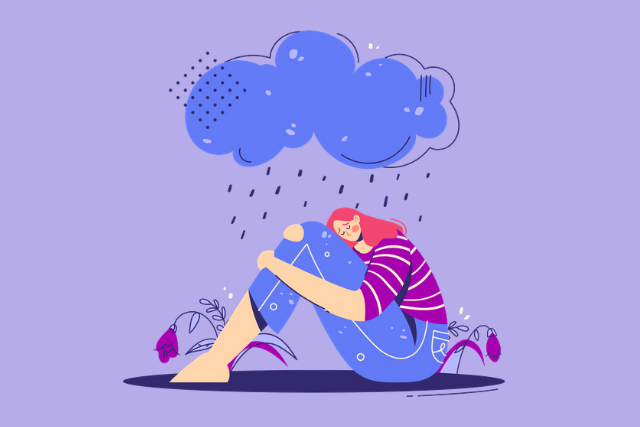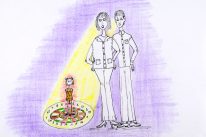
“The light at the end of the tunnel might seem a long way off. But the switch may be very near.” ~ Anonymous
When I think about it now, the ominous signs of postnatal depression were there even while I was pregnant.
What started with worries and anxieties would continue to escalate after the birth of my child, finally coming together like a perfect storm, to become a deep, dark depression that would threaten to take my life away from me.
Eighteen months after my daughter was born, now barely able to function, I found myself alone in the grounds of a mental health unit. I remember quite clearly looking up at the sky and asking aloud a question that would come to change the course of my life.
“How did this happen?”
I’ve spent the last twenty-five years unearthing the answers.
The Landscape Changed Around Me
I had sailed through my first pregnancy. My son was a placid baby and slept so much I sometimes had to prod him awake just to make sure he was fed. Life felt perfect but, between my first and second pregnancy, the landscape of my world began to shift and change around me.
We moved. We took on a much bigger loan, but within a few months interest rates had risen so much we could barely make the payments. The property market had gone from boom to bust, and the value of our house came crashing down around us, threatening to throw us into negative equity. Now we couldn’t move again even if we wanted to.
The financial pressures caused tensions. This was when I found myself pregnant for a second time. I felt a confusing mixture of joy and fear. This second pregnancy would be nothing like the worry-free first.
And there was another problem: I wasn’t sure I even liked our new house, or, more to the point, where it was—right next door to a busy pub. Now pregnant, I began to focus more and more of my frustration and anxiety onto the pub and everything I hated about it.
I hated the way its upstairs window overlooked my garden. I hated the smell of cooking and the sound of people drinking and laughing outside. When I was hot and sleepless at night, if I leaned out of the bedroom window, I could just about hear the extractor fan buzzing relentlessly. How I hated that extractor fan!
Trapped
I felt trapped and unhappy. All the worrying in the daytime ensured I slept restlessly at night, or not at all, and I grew more tired.
Midway through the pregnancy, I caught shingles. Not only could I not take any medication to ease the pain because of possible side effects, but I grew worried about whether the shingles would affect my unborn child.
But I kept soldiering on, pretending to the outside world that everything was okay. When people greeted me with “Hi, how are you?” I would smile and say, “I’m fine,” as we all do. Nobody wanted the true answer, it seemed to me.
There was another problem in admitting I wasn’t coping: I didn’t want anyone to think I was anything less than a perfect mother, and there was an underlying concern, whether real or imaginary, that my children might be taken away from me.
By the time my daughter was born, I was already running on empty, and perhaps that was partly why she was restless, demanding, and so different from my first child. She had eye problems, joint problems, and, as it later turned out, a hole in the heart too, as a result of the shingles.
By now I felt I was a different person altogether. Hollow-eyed, tired yet wired, I was plagued by a feeling of heaviness, vague aches, pains, and stomach problems. I finally visited my doctor and told him I thought I was having a nervous breakdown. His response was to put me on a four-month waiting list for counseling and to give me a prescription for the antidepressant Seroxat.
I started taking them and felt so much worse. Now I was foggy-headed and confused too, and I started having disturbing nightmares, often, violent ones. I’ve since found out these are common side effects. It was Christmas and I couldn’t even raise the energy to cook a Christmas dinner. When I did eat, I couldn’t taste the food. I felt I was shutting down.
I eventually ground to a halt and had to admit how things were for me. The perfect mother mask had finally slipped, and I had no alternative but to be more real. When people asked me how I felt now, I told the truth and it was a relief. Being fake, as it turns out, is really tiring.
I accepted all the help I was offered. I had no choice.
I was referred to a counselor, which helped a lot. Finally, I could offload all the worries and ruminations to someone who didn’t judge me, who simply allowed me to talk and hear my own thoughts.
Friends and neighbors rallied round. People offered to mind the children so I could take a break. I felt I’d forgotten who I was and had to find myself again.
Months later, feeling calmer, I wandered into the garden and sat down, with my back to the pub, on a swing seat.
From here, I had a view of my home I had not really seen before. A pretty thatched cottage lay before me with roses around the door and colorful flowers tumbling down from its window boxes. Fatman, my cat, laid stretching and dozing on the path in the sun, and my children slept, safe and sound, inside.
And in that moment, my perception shifted. I suddenly saw things from a different angle and realized that nothing in my life needed to change; I simply needed to change the way I was looking at my life. Things had happened to me and around me over which I had no control. Finally it hit me like a speeding train: My real control was over the way I chose to respond to those events.
Nothing, and nobody, could make me unhappy without my permission.
It was a moment of clarity and insight that became the turning point in my recovery. It was also the start of my long quest to uncover the mysteries of depression.
How Antenatal Depression Begins
Being a mother can be the most rewarding, yet the most demanding, of roles. Society has high expectations, especially now with social media piling on the pressure for perfection. Antenatal depression can resolve with the birth of the baby or might evolve, as it did for me, into postnatal depression.
The signs and symptoms of anti, and postnatal, depression are the same as for any depression:
- Tears and feelings of sadness
- Restlessness and insomnia
- Difficulty concentrating
- Edginess, anxiety, or panic attacks
- Irritability with yourself, others, or life in general
- Loss of appetite or overeating
- Severe fatigue and wanting to stay in bed
- Difficulty leaving house or handling social situations
- Aches and pains
- Loss of interest in things you used to enjoy
- Loss of hope about the future
- Feelings of guilt or self loathing
How to Get the Help You Need
Be open.
Communicate with those around you. Explain how you are feeling and ask for support. Talk to friends and family. Other mothers are probably not as confident and upbeat as they appear to be. When you’re honest, it gives others permission to own up to being less than perfect too. Being authentic means you don’t have to pretend, which is such a relief.
Speak to your doctor about what you’re going through, as well. Many pregnant women and new mothers feel guilty about having negative feelings at a time when they think they should be happy. But being open and sharing your concerns will help you, and others, understand and overcome the problems.
Go online.
There are many forums now that support mothers and parents. There is nothing to feel guilty or ashamed about if you are anxious or down. Plenty of others do. Talking openly to others who understand can relieve the burden and isolation.
Take “me time.”
Self-care is not vanity. You may be busy running around after other children or family, but you do need to take your physical and mental health seriously and support yourself with a healthy diet, plenty of rest, and some fun too.
Keep a journal.
Write down how you feel, to get thoughts from the inside to the outside. However, remember also, to keep a gratitude list rather than just focus on the negatives. Bring to mind the things that have gone well, like a trip out with friends or even a beautiful sunset.
My list grew longer the more I searched for the positives. As I expressed my gratitude for the things I hadn’t previously paid attention to like my home, my health, a good meal, or even a lovely sunset, I started to be more mindfully aware throughout the day.
I began to harvest the good stuff and started to feel better. I now know that when we actively look for the good and express our gratitude and thanks, we are re-setting our internal brain filters and begin to re-wire for positivity.
Practice meditation and mindfulness.
Track down a local yoga or meditation class. If you can’t visit a class, download one of the relaxation apps and downloads that are now available online. Learning to focus on the present moment trains the brain to switch off when you want it to. In this way, you can take a break from all that negative internal chatter.
Get some talking therapy.
Agencies such as MIND or Rethink or the Samaritans offer low cost, or no cost, support, and there are many private therapists too.
Talking to a professional has some real advantages. They are trained to listen and offer support, and they can help you heal your past and identify changes you may need to make to meet more of your emotional needs.
Don’t try to be perfect.
Finally, cut yourself some slack. You don’t have to be the perfect wife, the perfect mother, the perfect daughter, or perfect anything else for that matter!
Consider the wisdom in the ancient tale of the carpet weavers.
The carpet weavers, who were experts at their trade, would spend many months creating the most beautiful carpets, but just at the point of completion, they would deliberately weave a mistake into the intricate pattern, because, as they said:
“To aspire to be perfect is to aspire to be god-like and who are we, mere mortals, to be as the gods?”
Editor’s Note: Although the author did not have a positive experience with medication, everyone’s experience is different. Please consult your doctor before considering stopping any prescribed medication.
About Frances Masters
Frances Masters is a BACP accredited psychotherapist, coach and training consultant. Author of the book PTSD Resolution, she also writes over at https://www.thefusionmodel.com In 2009, Frances founded the charity Reclaim Life; training its volunteers to work in the new, dynamic mental health model, Fusion®. That training became accredited by the National College of Further Education as a Therapeutic Coaching Diploma.













 Though I run this site, it is not mine. It's ours. It's not about me. It's about us. Your stories and your wisdom are just as meaningful as mine.
Though I run this site, it is not mine. It's ours. It's not about me. It's about us. Your stories and your wisdom are just as meaningful as mine.
We all know the importance of learning to love ourself, but when you become bombarded by negative thoughts and emotions this becomes a challenge.
In the mindfulness therapy approach that I teach we learn to meditate on those negative emotions themselves. The real problem is actually not the emotions or thoughts but the way we blindly identify with them, the way we inadvertently allow them to suck us into the state of shame or anger or fear or depression. Through mindfulness meditation training we stop this blind habit of reactive identification and learn to re-inhabit our True Self as the Observer of our emotions and thoughts. This is vital otherwise we simply feed the negative emotions and spiral out of control.
The we learn to establish a mindful relationship with our emotions, then we can start exploring how to respond to them with compassion and love, for this is what they need to resolve and heal. Building this inner compassionate relationship with our thoughts IS learning to love ourself again. I have found the mindfulness approach to be invaluable when working with all forms of depression, including PND.
The Boulder Center for Online Mindfulness Therapy